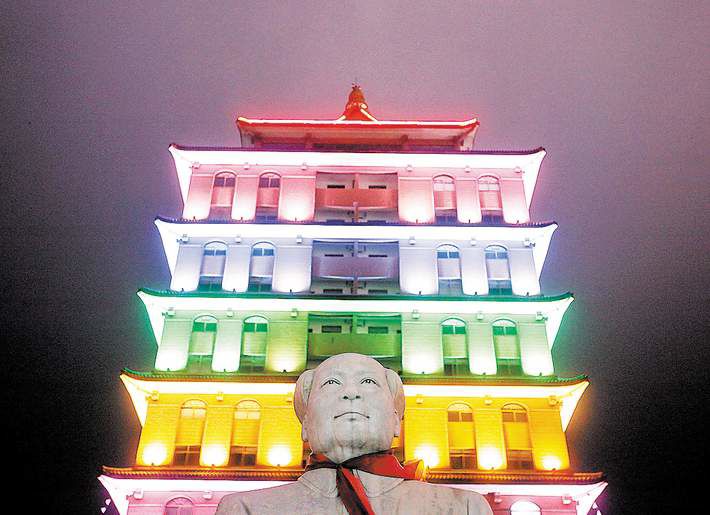Rain is the least of worries for Chinas parade
Published 5:00 am Wednesday, September 30, 2009

- A statue of Mao Zedong in front of an illuminated building in Jiangsu Province. Advanced weaponry, performers, and masses of students and precision-marching soldiers will roll through Beijings Tiananmen Square this week to mark the 60th anniversary of the Communist Revolution. The parade is to be a display of Chinas growing political and military strength, and preparations have consumed this countrys top leadership. The Thursday parade, the first in 10 years, marks Chinas continuing rise since the Communist Party shed its strict ideology and started embracing economic reforms in the 1980s.
BEIJING This is a parade that demands state-level security. Discipline. Extreme secrecy.
Ordinary people will not be allowed anywhere near the parade route in Beijing this Thursday, when the Peoples Republic of China marks the 60th anniversary of its 1949 founding with a military parade. That applies even to people who live in the neighborhood: Entire apartment buildings along the route toward Tiananmen Square are being evacuated to prevent residents from watching. Cameras and binoculars are forbidden in many locales.
Trending
As the city prepares for the parade, Beijing feels less like the dynamic capital that wowed the world during the 2008 Summer Olympics and more like a city under martial law.
The more than 80,000 students marching in the parade have been forced to sign secrecy agreements that prohibit them from talking to the news media (Chinese and foreign alike), sending text messages, and posting blogs or photographs of parade rehearsals.
Supermarkets have been ordered not to sell sharp knives, and the mailing of soap, toothpaste and liquids within Beijing is forbidden, apparently out of fear they could be used to make explosives. People living near the parade route are forbidden from having guests in their homes or using their balconies. Pigeon fanciers have been told to keep their birds grounded.
Even kite-flying has been banned since mid-September.
Are we having fun? demanded a sarcastic Li Datong, a retired editor from the China Youth Daily who is one of the few who has spoken out publicly against the parade. Does this look like a country at peace?
A display of control
Trending
When it comes to celebrating the modern countrys communist roots, the cowboy capitalism and media-savvy youth of 21st-century China take a back seat to tradition. Michael Anti, a Chinese blogger and social critic, says the inconvenience posed by the parade is not incidental but part of the message.
The Communist Party wants to show the young people it still has control. Theyre saying in effect, Even though you might have Twitter, Im the one with power, said Anti. The focus of the parade is to get people to act in a collectivist manner like North Koreans.
A security official speaking on condition of anonymity said security is tighter this year than in 1999 the year of the last parade because ethnic violence in western China has prompted fears of terrorism.
The inconveniences have been large and small. Successive rehearsals on weekends over the past month have virtually paralyzed the city. With checkpoints on the main roads and bus and subway service suspended, businesses had to discharge employees early and close up at an incalculable financial cost.
And when rains delayed a rehearsal earlier this month from a Saturday to a Sunday, the exclusive French restaurant Boiled, fully booked for a reception, had to close and refund customers their money.
Although Beijingers are resigned to the omnipresence of big government in their lives, they have begun to grumble at least among themselves.
Cant you see how much business were losing? barked the owner of a store selling cigarettes and drinks near Tiananmen Square.
Voicing complaint
Complaining about the parade is a taboo subject hence the secrecy agreements that the parade participants were forced to sign. But its almost impossible in the 21st century to keep students from blogging their discontent, and some criticism has managed to make it on the Internet.
Tens of thousands of students in Beijing ranging from 14-year-olds to college freshmen were told in the spring they had to volunteer for the parade. Participants had to give up most of their summer vacation and attend 12-hour rehearsals that often lasted until 3:30 a.m., flipping colored fans that spell out Communist Party slogans.
We Chinese torture ourselves for some face and superficial pride, wrote one student, who said that teachers had insinuated that a refusal to participate could affect their future academic career. Forcing people to participate in the parade can become a new Guinness world record of ridiculousness.
The blog posts were removed quickly, and some students received visits from the police.
No doubt, there are many older Chinese who appreciate the pomp and formality of the tradition. We do these parades every 10 years, and each time it is exciting, said 81-year-old Li Wei, a retired Communist Party official from Shanxi province who had come to Beijing for the parade but will watch on television.
But even a decade ago, some critics were complaining that the parade was an anachronism going into the 21st century.
No less esteemed a figure than the late Li Shenzhi, an intellectual who served as premier Zhou Enlais diplomatic secretary, wrote in 1999 in an essay published in Hong Kong that the military parade reminded him of the worst authoritarian regimes in the world: There are not so many countries left in this world that want to show off like this. My humble guess would be only North Koreas Kim Jong Il still has a passion for this sort of thing.







